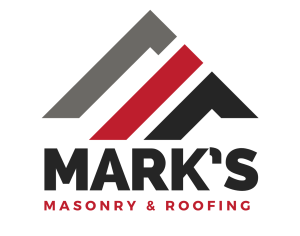Essentially, masonry projects include any work that deals with stone, brick, or concrete. This can include walkways, walls, home exteriors, and more. Masonry units (i.e., stones or bricks) are generally laid and bound together by mortar.
Mortar is a sort of paste that binds stones and bricks together.
It is made up of sand and cement particles. Often, masons specialize in one of the three areas. They are either stonemasons, brick masons, or concrete masons. Though skilled masonry professionals sometimes do all three.
So, fixing those broken bricks, laying a stone walkway, applying concrete sealer, and building that stone fence are all examples of masonry projects. And you should think twice before tackling any of them on your own..jpg)
Call Mark's Masonry and Roofing.
Whether you’re interested in laying a brick path from your driveway to your front door, a ground-level patio, or simply creating a safe and beautiful space for an above-ground fire pit or grill, bricks are an affordable, durable, and timeless choice.
Before you call a mason or decide to do the work yourself, you’ll need a basic grasp of brick patterns. If laying bricks yourself, determine if your space has curves and whether you prefer a pattern requiring cuts, as both require expertise. Consider hiring help if unsure about advanced tasks.
Here are six common brick patterns, from the easiest to the most difficult.Also called subway tile, the running bond consists of rows of staggered bricks laid end-to-end. This pattern can easily accommodate light curves, making running bonds excellent for pathways and patios.
As very minimal cutting is needed, just straight edges, running bonds suit novice bricklayers. Rotating the pattern 45 degrees creates visual interest through a diagonal orientation while maintaining simplicity.
A stack bond design resembles the running bond with one difference: rows are laid parallel rather than staggered.
While precisely aligning rows takes time, you don’t have to do any cutting, suiting stack bonds to curves. The pattern’s orderly appearance comes from proper brick spacing, making it ideal for small patio and garden path projects.
Herringbone
Alternating bricks at 45- and 90-degree angles produces a zigzag resembling fish bones, which pavements during the Roman Empire featured. Minimal edge cutting eases laying herringbone patterns, though time-consuming for novices.
You need to space chalk lines properly to prevent errant zigzags. Dry runs for further accuracy. The striking yet uniform appearance suits driveways, patios, or garden walkways.



